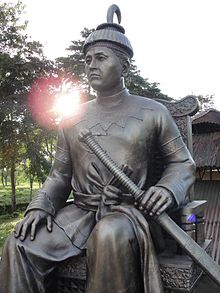Ahoms was a Tai-Mongoloid group who migrated to Assam from around present-day Yunan Province of China. Siu -ka -pha was the first Ahom king in Assam. The Ahoms were given stiff resistance by the Kacharis who dominated eastern Assam. But slowly and steadily, through a policy of conciliation and assimilation and military might, the Ahoms consolidated and expanded their position in the Brahmaputra valley.
Sukapha was the third son of Phu-Chang-Khang alias Chao Changnyeu,a scion of Mong-Ri mong-Ram line of kings of Khun-Long’s family. He along with about 9000 followers, 300 horses fitted with saddles and bridles and two elephants followed a known route from Yunnan to Assam that
passed through Myitkyina, Mogaung and the upper Irrawaddy river valley and crossed the Patkai hills. On his way he stopped at various places and crossed the Khamjang River to reach the Nangyang Lake where he fought and defeated the Nagas and reached the Brahmaputra valley in the early 13th century.Sukapha ,the founder of Ahom Kingdom in Assam.His good governance not only influenced the Ahom kingdom but also the other small empires in Assam, then known as Kamrup. To make the Ahom dynasty powerful and permanent he undertook conciliatory measures towards the neighbouring kings. He appointed Katakis and two chief Buragohains and Borgohains which were most essential for the foundation, growth and prosperity of his newly established regime.
Sukapha sent a series of campaigns to the neighbouring countries which were ruled at that time by the Chutias, the Morans, the Borahis, the Nagas, the Kacharis and the most powerful kingdom of the region, Kamrup. After having conquered the countries of the Chutias, the Kacharis and the Kamata king, Sukapha allowed them to remain as they were in the past on condition of offering tribute. The Borahi king Badancha and the Moran king Thakumtha acknowledged the supremacy of the Ahom king and regularly supplied him thenceforward with the various products of the jungles, elephants, dye, honey and mats, Sukapha wisely adopted facilitatory measures towards those people and by treating them as equals and encouraging intermarriage, he united them into one nation.
- APSC Mains 2024 Tests and Notes Program
- APSC Prelims Exam 2020- Test Series and Notes Program
- Apsc Prelims and Mains 2024 Tests Series and Notes Program
- Apsc Detailed Complete Prelims Notes

 and join our Telegram channel: https://t.me/pscnotes2025](https://assam.pscnotes.com/wp-content/plugins/feeds-for-youtube/img/placeholder.png)